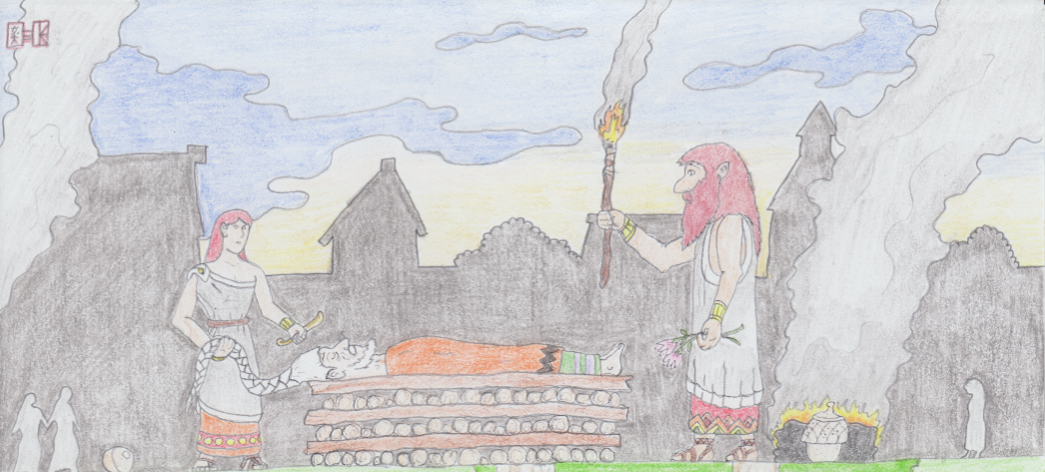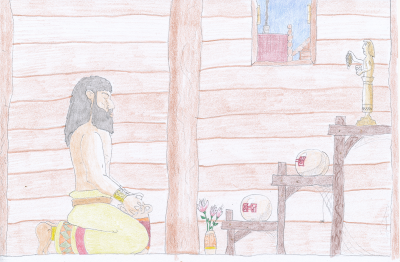Útel ancestor worship
Ancestor worship is the key component of Útel religion and an important part of their daily lifes, since keeping the ancestral spirits happy is believed to bring fortune and prosperity in the world of the living.
Zynai is honoured every year by burning a mixture of wine, honey and almond milk in a sacred vessel.
An important part of communing with the ancestors is reciting certain formulas in Old Útelic language.Libations
Meditation
Offerings of Aned'ber Flowers
Prayer
Many Útels believe that the spirit of their ancestor wont find rest unless the urn is cast down Qaþúlanz Falls in the northwest, where a pleasant afterlife awaits under the sea. Ancestors are honoured by placing the jar containing their hair in a shrine at home, where people come to meditate, pray or offer libations of wine and almond milk.
Worldview
A notable part of Útel religion is that it almost completely lacks any sort of creation myths or ideas of the ultimate fate of the world; it's simply has always been there. The closest thing to a creation story are vague references to long forgotten Alalarían beliefs, such as that people were originally transformed from wild grapes that fell to the ground long ago.Divinities
Ela'k
Ela'k is the main culture hero of the Útels, who consider him the symbolic ancestor of all Útels. He's worshipped as the inventor of the caste system, farming and animal husbandry, weaving and metallurgy. When elder councils are set, whether local or concerning the whole country, libations are offered to Ela'k to make sure he's watching.Zynai
Zynai was one of the last Útel tribal chiefs, credited with founding of the Útel system of elder councils, thus ending the constant feuds between city-states before the classic period. It's said that Zynai convinced her son and rival tribal chiefs to visit her as she laid on her deathbed, and announced her final wish that they would find a way to unify the Útels and make that peace last indefinitely. Since last wishes are sacred to the Útels, the chiefs did as she asked and eventually laid the foundation for the system used to this day.Zynai is honoured every year by burning a mixture of wine, honey and almond milk in a sacred vessel.
Founders of the castes
Each caste has its own culture hero or a founder, who's honoured by libations and prayers by their statuettes in every home. Exact rituals differ from one caste to another; members of the swineherds' caste sprinkle pigs' blood on the statuettes, while fishermen present catch of the day to them.Family ancestors
Worship of ones own ancestors is centered around the family shrine, a special room where sealed, spherical jars containing the hair of deceased family members are kept safe. Most people visit a shrine every day or so to pray and perhaps offer libations, while more pious Útels spend a good portion of the day meditating and making offerings.An important part of communing with the ancestors is reciting certain formulas in Old Útelic language.
Rituals
Festivals
Ljarúk Anedú
Ljarúk Anedú is an annual ritual perfomed by elder Útels of þil-naa, the vintners' caste. It takes place in a remote clearing at night, during the grape harvest. The elders sit around a campfire and pass a bowl of overripe grapes to eat, after which they put on wooden masks adorned with vine leaves. One elder starts playing a drum, while the others sing praise to the ancestral spirits Ela'k, Zynai and founders of the castes for good harvest. The masks they wear are similar to those traditionally used by yþrú-naa, the shamans' caste, but without holes for the eyes. The ancestors are believed to roam the world of the living that night, and seeing a familiar face among them could be distracting, which would ruin the ritual and anger the ancestors.Funerary rites
When an Útel dies, the body is taken to a member of aned-naa, the funerary caste, where it's washed and a tiny loaf made of almond milk and the roots of the aned'ber flower placed inside the mouth. The hair, if any, is braided and cut off before being sealed inside a spherical jar. After this, the body is cremated and remains stored in an urn shaped like an acorn.Many Útels believe that the spirit of their ancestor wont find rest unless the urn is cast down Qaþúlanz Falls in the northwest, where a pleasant afterlife awaits under the sea. Ancestors are honoured by placing the jar containing their hair in a shrine at home, where people come to meditate, pray or offer libations of wine and almond milk.
Structure
Útel ancestor worship is not an organized religion, rather it's a general term for the various forms of ancestor veneration practiced by the different castes and tribes of the Útels. The closest thing to priests are the elders of each family, who teach younger members the different rituals and prayers needed to keep the ancestors satisfied.





Comments